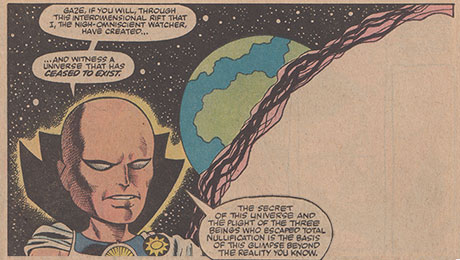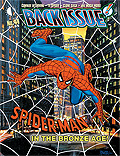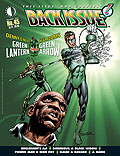 Doug: You can argue with me if you want, but I'm going to make the statement that the Fantastic Four, "The World's Greatest Comic Magazine", is the single-most important and influential comic book of the Silver and Bronze Ages. Brought to us by Stan Lee, Jack Kirby, Joe Sinnott, Roy Thomas, John Romita, John Buscema, Rich Buckler, George Perez, and John Byrne (anyone's list of Hall of Famers), the FF defined the Marvel Universe. Think about it -- the Skrulls, Dr. Doom, the re-introduction of the Sub-Mariner, the idea that there can be life on the moon, the Inhumans, the first intra-company crossover, multi-part epics, the first Black superhero, Galactus, the Silver Surfer, and the Watcher, the Negative Zone, the Kree, and on and on -- this book sits at the pinnacle of creativity in the period 1961-1985. So again, you can put the gloves on and we'll go a round or two...
Doug: You can argue with me if you want, but I'm going to make the statement that the Fantastic Four, "The World's Greatest Comic Magazine", is the single-most important and influential comic book of the Silver and Bronze Ages. Brought to us by Stan Lee, Jack Kirby, Joe Sinnott, Roy Thomas, John Romita, John Buscema, Rich Buckler, George Perez, and John Byrne (anyone's list of Hall of Famers), the FF defined the Marvel Universe. Think about it -- the Skrulls, Dr. Doom, the re-introduction of the Sub-Mariner, the idea that there can be life on the moon, the Inhumans, the first intra-company crossover, multi-part epics, the first Black superhero, Galactus, the Silver Surfer, and the Watcher, the Negative Zone, the Kree, and on and on -- this book sits at the pinnacle of creativity in the period 1961-1985. So again, you can put the gloves on and we'll go a round or two... Doug: ...or, you can start scratching your head and come up with the second-most influential comic book of the Silver and Bronze Ages. Any company, any era within the era. Have at it.


















































11 comments:
I'd vote for the comic that introduced the Justice League of America, the Silver Age version of Hawkman, the Teen Titans, Metamorpho and Green Arrow's new look: The Brave and the Bold
Doug- hard to argue with your assessment of the Fantastic Four; Marvel basically built itself around that book.
Ray- you make a good case for B&B.
I'd make a similar claim for Showcase. Aside from initiating the Silver Age with the debut of the Flash, it featured (among others) introductions of Green Lantern, Adam Strange, The Atom, and the Metal Men. It also revived the Spectre and the Phantom Stranger. And, of course, it gave us the Inferior Five...
I'd be happy to agree that The Fantastic Four was the most important comic book of the Silver Age. However it's existance was bourne out of the Justice League and _that_ existed because of the succesful revivals of The Flash, Green Lantern and the Atom.
Showcase and Brave and Bold are good choices but I think they violate the spirit of the question since those series were tryout books for various concepts not specific concepts themselves.
I would have to nominate Amazing Spider-Man as the most influential book of the decade. It has been so influential that we forget how different comics were before it came along.
Before him, all heroes were square-jawed adults whose secret identity lives were perfectly normal. Peter Parker was the first one who lived in something that resembled the real world: School, money problems, girlfriend trouble, an asshole boss, etc.
That and, of course, Steve Ditko's groundbreaking art and innovative character designs and Stan Lee's freewheeling plots. ASM is the template for pretty much ever solo title that followed.
I think Conan the Barbarian was a hugely influential Bronze Age book, as was Tomb of Dracula. Joe Orlando's late 60s mystery books don't have recurring characters or any continuity to speak of (only Phantom Stranger has the flimsiest connection from one issue to the next in the Adams issues).
Conan was an award-winning title, spawning several spin-offs in different formats- pretty much the Wolverine of his day.
Doug, I have to agree with you on the Fantastic Four. Besides the seemingly endless list of innovations, it was just so darn fun to read once all the characterizations were in place. Although issues 25-26 don't mark the start of company-wide crossovers, I feel they took it to a whole new level.
I see 2nd place as a tie for Spiderman and the Justice League. As Dandy stated, without the JLA, you have no FF. The stories were hokey, and Sekowsky's art from that period hasn't aged well. But, they did well by reflecting the early 60's spirit of American teamwork. It deserves its place as DC's flagship title of the time. Also, Stan took further inspiration from it for the Avengers.
However, Spiderman was another enormously innovative title of the 60's. The art, writing, and characters started out great, and just kept getting better and better, helping to elevate the artfrom itself. Spiderman's rogues gallery is right up there with Batmans.
So, since it seems to be a tie, I'll have to go with the Blackhawks in their super-hero phase instead. Pure innovation
James Chatterton
Amazing Spider-man gets the Silver.
1st teen hero who wasn't a sidekick, sort of grew up with his initial audience. One of the best/deepest supporting cast in pop culture(not just comic book) history. In terms of individual comic characters,only Superman & Batman rival his popularity.
I'd agree that Fantastic Four was probably the most influential comic book of the Silver Age (though it was influenced by others), but the most influential of the Bronze Age would have to be the X-Men. Claremont, Cockrum and Byrne's run built the foundation for what essentially became a mini industry.
Agree with the importance of FF, but I also agree with Inkstained about Spider-man. In fact, I would say those two titles are kind of tied for first place, at least in the Silver Age.
As for second place, my vote goes to Charlton's E-man... ;)
Can only agree...FF and Spidey. What is kind of fascinating about the two comics is Stan being on a suicide mission both times. He had pitched Spider Man to Martin Goodman several times without success (‘but...people don’t LIKE spiders’) and only when AF was being cancelled and Goodman said ‘I don’t care, do what you want with the last issue’ did Stan decide to really go for it. They had all but forgotten about him when, months later, post-publication, the fan mail started arriving by the truckload. They didn’t even have a publication slot for him and had to cancel the Hulk to make space.
Likewise with the FF, as several people have pointed out, it was the JLA, or more precisely a game of golf that Martin Goodman had with Mort Weisinger, that led to him telling Stan to create a new super hero team. Timely was almost dead at the time with Stan as the sole employee. He’d spent the 40’s being told to do super heroes Goodman’s way and couldn’t believe that after 20 years he was right back where he started. He decided to resign, but his wife persuaded him to go out on a blaze of glory and do it his way, get sacked and go down fighting for what he’d always believed in.
Kirby, on the other hand, had never been anything but a comic artist, he had a wife and children to feed and no plan B, so when he was told that there was a new super hero comic to be launched and he’d got the gig, he was absolutely determined to make it a hit. So he and Stan met up, each utterly determined to make FF#1 an absolute milestone, but for completely opposite reasons and with a totally different vision of what was going to happen next.
The thing that is lost is the irony: when you know that Stan was writing his swan song, you can see the ironies: The world’s stuffiest, stiffest scientist becomes the world’s most flexible man, the impetuous teenager, instead of always knowing best, is for once a literal hot-head, after 20 years of monsters coming to destroy the earth, we have a monster who is coming to save it and of course, a fully fledged female member of the team, who actually has her own super powers and for once isn’t just.....invisible.
When you read stuff like She-Hulk and Lost Generation, which is designed to deconstruct the comic book myth, you forget....Stan got there first!
Richard
I support the claim that the Fantastic Four are the single most important title based on the characters introduced and featured in its pages.
I also recognize the point about Amazing Spider-Man being the flagship title. It was ASM that dealt with political unrest, drugs, and death of beloved characters.
Ultimately, my vote goes to the FF.
One question: does the winner of this discussion get the gold or the (possibly more coveted, on this site at least) Bronze?
Post a Comment